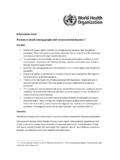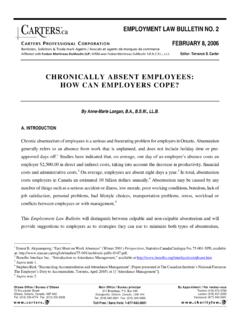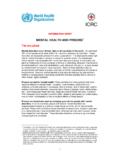Transcription of Addiction Stigma language- The Words we use matter
1 National Alliance of Advocates for Buprenorphine TreatmentThe Words We Use matter . Reducing Stigma through remains the biggest barrier to Addiction treatment faced by terminology used to describe Addiction has contributed to the derogatory, stigmatizing terms were championed throughout the Waron Drugs in an effort to dissuade people from misusing substances. Educationtook a backseat, mainly because little was known about the science ofaddiction. That has changed, and the language of Addiction medicine shouldbe changed to reflect today s greater understanding.
2 By choosing languagethat is not stigmatizing, we can begin to dismantle the negative stereotypeassociated with Addiction . Changing the Stigma will benefit everyone. It will allow patients tomore easily regain their self esteem, allow lawmakers to appropriatefunding, allow doctors to treat without disapproval of their peers, allowinsurers to cover treatment, and help the public understand this is amedical condition as real as any the Words we use more carefully is one way we can all makea difference and help decrease the Why does language matter ?
3 Words to avoid and alternatives..In discussing substance use disorders, wordscan be powerful when used to inform, clarify,encourage, support, enlighten, and unify. On theother hand, stigmatizing Words often discourage,isolate, misinform, shame, and Excerpt from Substance Use Disorders: A Guide to the Use ofLanguage published by CSAT and SAMHSAF ollowing are stigmatizing Words and phrases which could be replacedwith the suggested preferred terminology as a start in reducing thestigma associated with Addiction .
4 Addict, Abuser, JunkieProblem with the terms: These terms are demeaning because they label aperson by his/her illness. By making no distinction between the person andthe disease, they deny the dignity and humanity of the individual. Inaddition, these labels imply a permanency to the condition, leaving noroom for a change in terminology: Person in active Addiction , person with a substancemisuse disorder, person experiencing an alcohol/drug problem, patient (if referring to an individual receiving treatment services).
5 AbuseProblem with the term: Although abuse is a clinical diagnosis in the DSM-IV and ICD10, it is stigmatizing because: (1) it negates the fact that addictivedisorders are a medical condition; (2) it blames the illness solely on theindividual with the illness, ignoring environmental and genetic factors, aswell as the ability of substances to alter brain chemistry; (3) it absolves thoseselling and promoting addictive substances of any wrong doing; and (4) itfeeds into the Stigma experienced not only by individuals with addictivedisorders, but also family members and the Addiction treatment field.
6 Preferred terminology: Misuse, harmful use, inappropriate use,hazardous use, problem use, risky , Dirty(when referring to drug test results)Problem with the terms: Commonly used to describe drug test results,these terms are stigmatizing because they associate illness symptoms( positive drug tests) with filth. Preferred terminology: Negative, positive, or Drug HabitProblem with the terms: Calling addictive disorders a habit denies the medical nature of the condition and implies that resolution of the problem is simply a matter of willpower in being able to stop the habitual terminology: Substance misuse disorder, alcohol and drugdisorder, alcohol and drug disease, active or Substitution TherapyProblem with the terms.
7 This implies that treatment medications such as buprenorphine are equal to street drugs like heroin. The termsuggests a lateral move from illegal Addiction to legal Addiction , andthis does not accurately characterize the true nature of the treatment. The essence of Addiction is uncontrollable compulsive first goal of Addiction treatment is to stop this dangerous addictivebehavior. With successful buprenorphine therapy, as part of acomprehensive treatment plan, the dangerous addictive behavior isstopped not replacedPreferred terminology: T reatment, medication-assisted treatment, with the term:The term is stigmatizing because it labels a person by his/her behavior.
8 It is also misleading because the termuser has come to refer to one who is engaged in risky misuse ofsubstances, but use alone is not necessarily terminology: Referring to use: person who misuses alcohol/drugs. Referring to misuse: person engaged in risky use of this sheet s companion web page at 10M 06/08 Copyright 2008, NAABT, The National Alliance of Advocates for Buprenorphine Treatment POBox 333 Farmington, CT 06034 following terms are considered effective in furthering publicunderstanding of addictive disorders as a medical issue, which, in turn, provides impact in reducing Stigma and it works.
9 This widely understood term describes uncontrollable,compulsive drug seeking and use, even in the face of negative health andsocial consequences. 1 There is a distinction between Addiction andphysical dependence, although the Words are often incorrectly usedinterchangeably. Addiction involves both social and health problems,whereas physical dependence only involves : Clinically speaking, both the DSM-IV and the ICD10 use the phrase substance dependence , not Addiction although thedefinitions are the same.
10 Addiction FreeWhy it works: Indicates the patient is free from the dangerouscompulsive behaviors of Addiction . Less stigmatizing than clean or sober yet shows the person is no longer in active SurvivorThis terminology is in line with other life-threatening diseases. ( cancersurvivor) It is a positive indication of a person s disease status. It is lessstigmatizing than recovering addict , especially to people unfamiliar withrecovery language. It also indicates that a person s treatment hastriumphed over active Addiction and shows that the person is substantiallypast the initial phases of recovery, unlike in recovery which doesn tdifferentiate between days or decades of Addiction -free Disorder, Addictive DiseaseWhy it works: By incorporating disorder or disease, these termsreinforce the medical nature of the TreatmentWhy it works.





